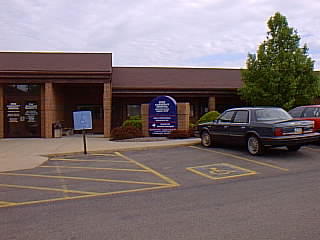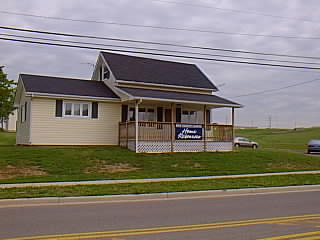According to Robert Polahar, chief executive officer of Knox Community Hospital, there are between 45-50 allopathic and
 osteopathic physicians practicing
medicine in Knox County today. While most of these physicians are associated with KCH, there are a few in the community
who are not, for a variety of reasons. There are three nurse practitioners in the county, all of whom have limited
privileges to work within the hospital itself. Generally, these "limits" include supervision by a physician.
In addition, there are five to six osteopathic physicians (D.O.s) in the county. However, "most manipulations
are done by chiropractors in this county."
osteopathic physicians practicing
medicine in Knox County today. While most of these physicians are associated with KCH, there are a few in the community
who are not, for a variety of reasons. There are three nurse practitioners in the county, all of whom have limited
privileges to work within the hospital itself. Generally, these "limits" include supervision by a physician.
In addition, there are five to six osteopathic physicians (D.O.s) in the county. However, "most manipulations
are done by chiropractors in this county."The practice of allopathic medicine focuses on the identification and alleviation of symptoms in order to treat disease. Practitioners all undergo some form of regulated training, part of which is clinical. This is usually part of a college or professional education. In order to practice medicine, individuals must pass comprehensive state licensing exams as well. The process of medical training emphasizes a number of professional values, including emotional detachment, professional socialization, clinical experience, intervention, and an emphasis on acute and rare illness (Weitz 1996). Such values provide an immediate contrast to the "sound body, sound mind, sound spirit" philosophy of holistic health care. However, integration of the two systems is a distinct possibility.
 The allopathic practitioners interviewed
for this project varied in exposure to holistic practices. Dr. Allan Bazzoli, who practices out of Knox Community
Hospital, works as a holistic and allopathic physician. Throughout his life, Dr Bazzoli has been "never not
interested" in holistic practices. Dr. Bazzoli has taken several steps to educate the community about health,
from hosting a monthly talk show on the Mount Vernon radio station WMVO on topics related to alternative health
care to giving seminars at the Mount Vernon Public Library on the same subject. He describes himself as an "open-minded
skeptic," and prefers to think of his work as integrative or complementary medicineľnot abandoning traditional
medicine, but not always using it as his first line of attack.
The allopathic practitioners interviewed
for this project varied in exposure to holistic practices. Dr. Allan Bazzoli, who practices out of Knox Community
Hospital, works as a holistic and allopathic physician. Throughout his life, Dr Bazzoli has been "never not
interested" in holistic practices. Dr. Bazzoli has taken several steps to educate the community about health,
from hosting a monthly talk show on the Mount Vernon radio station WMVO on topics related to alternative health
care to giving seminars at the Mount Vernon Public Library on the same subject. He describes himself as an "open-minded
skeptic," and prefers to think of his work as integrative or complementary medicineľnot abandoning traditional
medicine, but not always using it as his first line of attack.Dr. Bazzoli, however, seems to be one of few with his level of expertise. Other allopathic practitioners in the area did not seem to have the same level of interest. None spoken to, however, completely dismissed alternative therapies. Protesting ignorance, a primary care physician from Mount Vernon explained that though little holistic training was offered in medical school, whatever worked for patients should be advisable.
The allopathic practitioners of Knox County, therefore, have some knowledge of the holistic practices which take place in this county, though not necessarily experience.